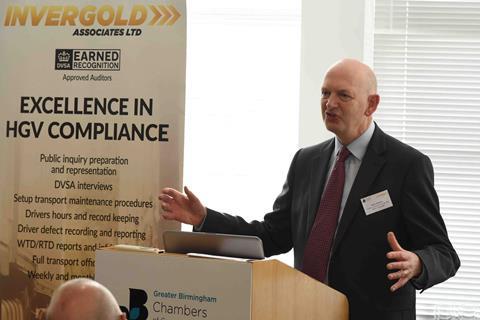
Much of James Backhouse’s piece appears to conflate DVSA and the Traffic Commissioners (TCs) together and confuses the role of the regulators (TCs) with that of the enforcement agency (DVSA).
Nonetheless, there are some points that we would like to address. Firstly, Mr Backhouse’s comments about the level of Office of the Traffic Commissioner (OTC) communications with the industry. He claims that many changes of policy adopted by DVSA and the TCs are introduced with little industry awareness.
We obviously cannot speak for the DVSA, but the OTC makes every possible effort to communicate with the industry, both in seeking input to consultations and in raising awareness of the law. We engage regularly with transport industry trade bodies and make every effort, where proportionate, to canvas the widest possible set of views when undertaking consultations.
In particular, we would highlight the work we did in consulting around Vocational Driver Conduct, for which we sought the views of a wide variety of different stakeholders and which also received coverage in trade media We would also point to the work the OTC did to prepare hauliers for leaving the EU and to raise awareness of the importance of brake testing.
The latter has yielded significant improvement in braking failures at annual test across the industry.
Looking to improve
But we’re always looking to improve. To increase the effectiveness of our communications, we have completely overhauled our privacy policy, allowing us to make better use of the information we hold. This includes sending all operators targeted compliance information, which will help keep them informed – including about consultations. We are also introducing a series of email messages for new operators to give them compliance advice and guidance. These will start being sent in April. All operators can sign up for email alerts on the OTC website and we would urge them to do so.
Secondly, there are Mr Backhouse’s comments on the guidance available from the TCs. He is right to say that the senior TC’s statutory guidance and statutory directions documents are legalistic – this is how they must be. To suggest otherwise would overlook the law under which they are issued. They are drafted to provide greater transparency to the way in which
TCs approach their judicial duties and set the framework for instructions to members of staff acting in support of the TCs.
The suggestion that simplified, plain English versions should be available also misses the point that the OTC is a small organisation with finite resources. Our priority is making the operator licensing regime run smoothly. You only need look at the efforts of OTC staff in addressing current times for processing licence applications and scheduling public inquiries.
Limited resources
The limits placed on OTC resources mean that feeding in to DVSA’s work is the most practical way we can produce guidance and share information about compliance. We agree that ‘The Guide to Maintaining Roadworthiness’ is excellent, but it is just one of many such pieces of guidance to which the TCs have and will continue to contribute. TC for the West Midlands Nick Denton has also fed in to DVSA’s seminars for new operators.
Lastly, we do not accept Mr Backhouse’s overall argument regarding the scope and application of the Regulators’ Code. It does not apply to civil proceedings, which includes public inquiries held before the TCs.
By selectively quoting from a finely balanced set of principles, Mr Backhouse risks contradicting the duty outlined in paragraph 1 of the Code that “regulators should carry out their activities in a way that supports those they regulate to comply and grow”.
The intention of the Code is to reduce regulatory burdens and support compliant business growth. If regulators were required to provide exhaustive guidance on every element of compliance, it would result in an over-prescriptive environment, which would be disproportionately expensive to the operators whose fees pay for operator licence regulation.
The Office of the Traffic Commissioner
DVSA policy also in-line with Code
All DVSA enforcement staff work from a policy framework which is written to be compliant with the Regulators’ Code.
DVSA always welcomes ideas on how we can improve the ways we consult and communicate, but it is aware that in 2019 an operator relationship survey found “nine in 10 operators are satisfied with the DVSA/government website or the DVSA ‘Moving on’ blog”.
DVSA guidance is available for subjects such as drivers’ hours monitoring and load security, but these can be backed up with commercially available monitoring systems and training.
DVSA and The Traffic Commissioners have refreshed the new operators’ seminars, which clearly and comprehensively set out operator responsibilities.
To communicate and engage with operators DVSA frequently:
• updates the gov.uk website with any new guidance, as Mr Backhouse mentions the ‘Guide to Maintaining Roadworthiness’ is a good example
• emails operators who have signed up to DVSA email news and alerts with links to the new guidance (this gains an enviable level of engagement from operators)
• writes blog posts explaining the changes to guidance or rules and shares this on email alerts and social media
• engages and consults with FTA, RHA and other stakeholder groups, as well participates in the Heavy Vehicle Industry Forum (the ‘Stanmore meeting’) which is attended by operators also
• shares information via industry media such as Motor Transport
Transport managers have a professional obligation to stay updated on industry changes and they can do this by engaging in the above ways or seeking training and guidance where needed.
Gordon Macdonald, head of enforcement policy, DVSA













